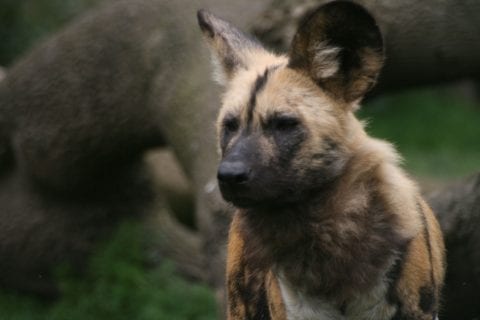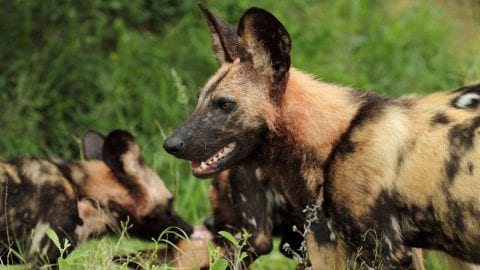Posted In Conservation | 20th September 2016
African Painted Dog Conservation
African painted dogs (previously known as African hunting dogs) have disappeared from much of their range and are classified as ‘endangered’. It is estimated that only 6,000 remain, making them one of Africa’s most endangered species.
Since 2009, Dublin Zoo has been financially supportive of the Painted Dog Conservation (PDC), which is located in Zimbabwe, southern Africa. The aim of this organisation is to protect the African painted dog ( Lycaon pictus ), which is one of the most endangered mammals in the world. Approximately 500,000 painted dogs once existed in Africa. Today, however, that number has dropped to approximately 6,000.

The PDC runs a number of conservation programmes, but Dublin Zoo is specifically involved with its rehabilitation facility and the annual Children’s Bush Camp.The rehabilitation facility takes care of orphaned or injured dogs while the Children’s Bush Camp teaches conservation as well as educates children about painted dogs and the importance of protecting them.
So, in this case, you can’t expect people to care about something, let alone take action to protect it.
The Bush Camp is a hands-on programme where children are exposed to nature trails and have the opportunity to visit Hwange National Park, which is home to the painted dog. Already, the programme is having a very positive impact. “Now, we have 40 people from one of the nearby villages involved in an anti-poaching unit. They go out collecting snares everyday. That has come from the Children’s Bush Camp,” Peter. explained. “Around 30 of those would have attended the Bush Camp as kids, and the others are parents of children who have attended. So, it really shows the power of these type of long-term programmes.”
The relationship between Dublin Zoo and the PDC is extremely important, according to Peter. The knowledge and expertise that have been shared with the PDC have been invaluable. “This is where our connection and links to the zoo world are really important. The zoos are a constant point of contact for us for advice. We know about the dogs in the wild, but we have had to learn from the zoos about how to deal with a captive situation.”
PDC Executive Director Peter Blinston visited Dublin Zoo recently. “The rehab facility was completed in 2003 to deal with any eventuality with painted dogs, whether they are sick, injured or orphaned,” he explained. “In the wild, only minimal treatment could be provided for dogs that are injured. Sometimes, they might need longer recovery following snare injuries, and other injuries. When they can be brought in for treatment, it is more effective. They are then released back into the wild.”
Painted dogs are highly social and live in organised packs, but their lives are impacted by poaching, traffic accidents, mining and other human-related activities. Saving the painted dog requires a change in mindset and behaviour, according to Peter. The Children’s Bush Camp has an integral role to play in this.
The Bush Camp started in 2004,” Peter said. “We now have a four-day residential programme supported by Dublin Zoo. This is aimed at 11-year-old children in primary schools in our local area and we also invite schools from all over the country. Approximately 1,000 children have come through this programme.
The mission of the Bush Camp is to create a level of connectivity between children and the dogs, according to Peter. “A lot of children grow up on the outskirts of national parks, but they have no interaction with the animals. So, in this case, you can’t expect people to care about something, let alone take action to protect it.”

The Bush Camp is a hands-on programme where children are exposed to nature trails and have the opportunity to visit Hwange National Park, which is home to the painted dog. Already, the programme is having a very positive impact.
“Now, we have 40 people from one of the nearby villages involved in an anti-poaching unit. They go out collecting snares everyday. That has come from the Children’s Bush Camp,” Peter. explained. “Around 30 of those would have attended the Bush Camp as kids, and the others are parents of children who have attended. So, it really shows the power of these type of long-term programmes.”
The relationship between Dublin Zoo and the PDC is extremely important, according to Peter. The knowledge and expertise that have been shared with the PDC have been invaluable. “This is where our connection and links to the zoo world are really important. The zoos are a constant point of contact for us for advice. We know about the dogs in the wild, but we have had to learn from the zoos about how to deal with a captive situation.”
